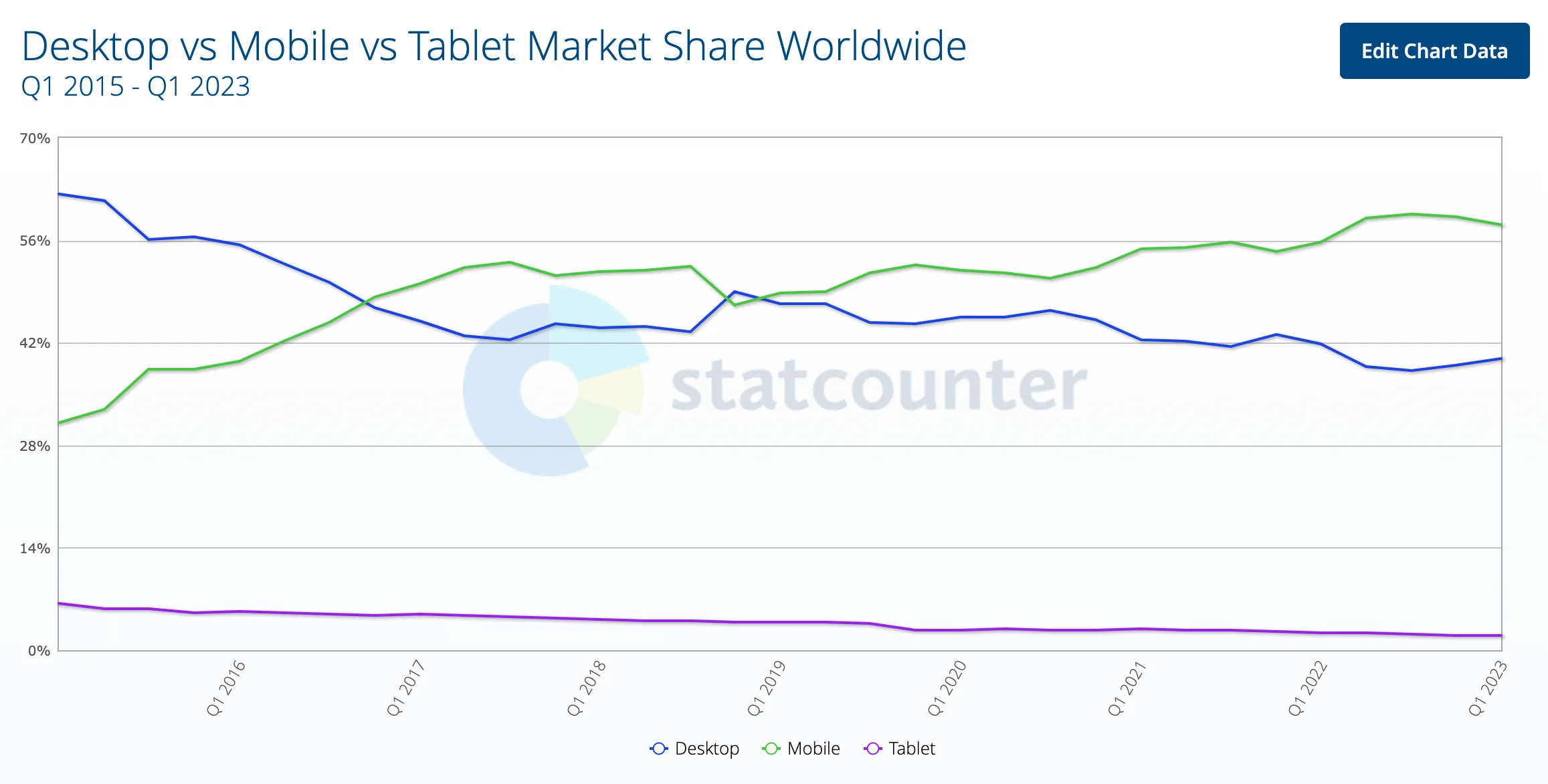Mobile Optimisation
2024 Updates
SEO Resources | Web Design Resources
In today’s digital landscape, mobile optimisation has become a critical aspect of maintaining a strong online presence. With the majority of internet users accessing content via mobile devices, businesses must ensure their websites are optimised for mobile to provide an excellent user experience and improve search engine rankings.
This article explores essential strategies for mobile optimisation in 2024, from understanding its importance to implementing key components such as responsive design, image optimisation, and page speed enhancements. By following these guidelines, businesses can stay ahead in a competitive market and deliver superior mobile experiences to their audience.
Understanding Mobile Optimisation
Mobile Optimisation Defined
Mobile optimisation involves enhancing a website to ensure it performs well on mobile devices. This includes adjusting the design, layout, and functionality to provide a seamless user experience. With Google’s shift to mobile-first indexing, where the mobile version of a website is used for indexing and ranking, optimising for mobile has never been more crucial.
The Importance of Mobile Optimisation
Statistics on Mobile vs Desktop Traffic
Not surprisingly, mobile traffic has surpassed desktop traffic in recent years. According to StatCounter, as of Q1 2024, approximately 59.57% of all web traffic comes from mobile devices, followed by 38.41% from desktop computers, and 2.02% from tablets. This evidence highlights the importance for businesses websites to prioritise mobile optimisation to meet user expectations and maintain visibility in search engine results. This is especially true for the younger generation of internet and social media users.


Impact on User Experience
A mobile-optimised website significantly improves user experience. Users expect fast load times, easy navigation, and content that fits their screens. Poor mobile experiences can lead to higher bounce rates and lower engagement, ultimately affecting a site’s search engine ranking.
SEO Benefits
Google’s algorithms favour mobile-friendly websites. Mobile optimisation not only enhances user experience but also boosts SEO rankings. Websites that load quickly, are easy to navigate, and provide relevant content are more likely to rank higher in search results.
Key Components of Mobile Optimisation
Responsive Design
Responsive design ensures that a website adapts to different screen sizes and orientations. This approach uses flexible grids and layouts, media queries, and scalable images. A responsive design provides a consistent user experience across all devices, which is essential for both user satisfaction and SEO.
Image Optimisation
Optimising images involves using responsive images, implementing lazy loading, and compressing image files to reduce load times. High-resolution images should be used judiciously to maintain quality while ensuring they do not slow down the site.
Page Speed
Page speed is a critical factor in mobile optimisation. Techniques to improve page speed include reducing server response time, leveraging browser caching, and using Content Delivery Networks (CDNs). Faster load times lead to better user experiences and higher SEO rankings.
Mobile-Friendly Navigation
Creating mobile-friendly navigation involves designing intuitive menus and touch-friendly elements. Common practices include using hamburger menus and ensuring buttons and links are easily clickable. Effective navigation helps users find what they need quickly, reducing frustration and improving engagement.
Enhancing Mobile User Experience
Content Creation
Content must be created with mobile users in mind. This includes writing shorter paragraphs, using bullet points, and incorporating multimedia elements like images and videos. Mobile users prefer concise, easily digestible content that is visually engaging.
Understanding User Intent
Optimising for user intent means understanding what users are searching for and providing relevant answers. This involves using long-tail keywords and natural language queries. Content should be structured to address user questions directly and clearly.
Avoiding Intrusive Interstitials
Google penalises sites with intrusive interstitials—pop-ups that cover the content and are difficult to close. Instead, use user-initiated pop-ups and ensure they are easy to dismiss. This approach maintains user experience while still allowing for necessary interactions.
Advanced Mobile SEO Techniques
Structured Data and Rich Snippets
Structured data helps search engines understand the content on your site. Implementing schema markup can enhance search results with rich snippets, providing more information and attracting higher click-through rates. This includes marking up products, reviews, and other relevant content.
Voice Search Optimisation
With the rise of voice-activated devices, optimising for voice search is becoming increasingly important. This involves using conversational keywords and providing direct answers to common questions. Voice search queries are often longer and more specific, so content should be tailored accordingly.
Local SEO
Local SEO involves optimising your website for local searches. This includes maintaining a Google My Business profile, using location-specific keywords, and ensuring consistent NAP (Name, Address, Phone Number) information across the web. Local SEO is crucial for businesses that rely on local customers.
Tools and Testing
Mobile Optimisation Plugins
For WordPress users, several plugins can assist with mobile optimisation. Plugins like WPtouch and Jetpack can help make your site mobile-friendly with minimal effort. These tools offer features like responsive design and image optimisation, simplifying the optimisation process.
Testing Tools
Testing is an essential part of mobile optimisation. Tools like Google’s Mobile-Friendly Test and Google Search Console can identify and fix mobile usability issues. Regular testing ensures your site remains optimised and performs well on all devices.
Final Thoughts
In 2024, mobile optimisation is not just an option but a necessity. By understanding its importance, implementing key components, and using advanced SEO techniques, businesses can enhance their mobile presence and improve their search engine rankings. Regular testing and updates will ensure your site continues to provide an excellent user experience, keeping your audience engaged and satisfied.
Mobile optimisation is a continuous process. Stay updated with the latest trends and best practices to maintain a competitive edge. By prioritising mobile optimisation, you can deliver superior mobile experiences and achieve your digital marketing goals.
Looking for cheap, fast, and reliable web hosting? Here’s what we recommend.
- Affordable Prices for a high quality
- Multilingual 24/7 Customer Support (20+ languages)
- 99.9% Uptime Guarantee
- Cloud hosting plans powered by Google Cloud
- Extremely Fast Servers
- PHP 7.4 live on all servers
- Optimized for WordPress/Onboarding Flow
- 1-Click Installer
- 30-day Money-Back Guarantee
- Extra Security with 2-Factor Authentication
Don't have Divi yet? Get it here today!!!
Other Helpful Articles…
SEO Audit: The Foundation of a Strong Digital Strategy | Comprehensive SEO Guide
SEO Audit: The Foundation of a Strong Digital...
Google Search Core Update August 2024
Google Core Update | August 2024 Google's...
AI Overview Keyword Research and Content Creation Strategy
Keyword Research and Content Creation Strategy...
Web Hosting Companies We Recommend for 2024
For Growing Businesses Looking for a company to support them
Great Server Performance + Great Local Support








